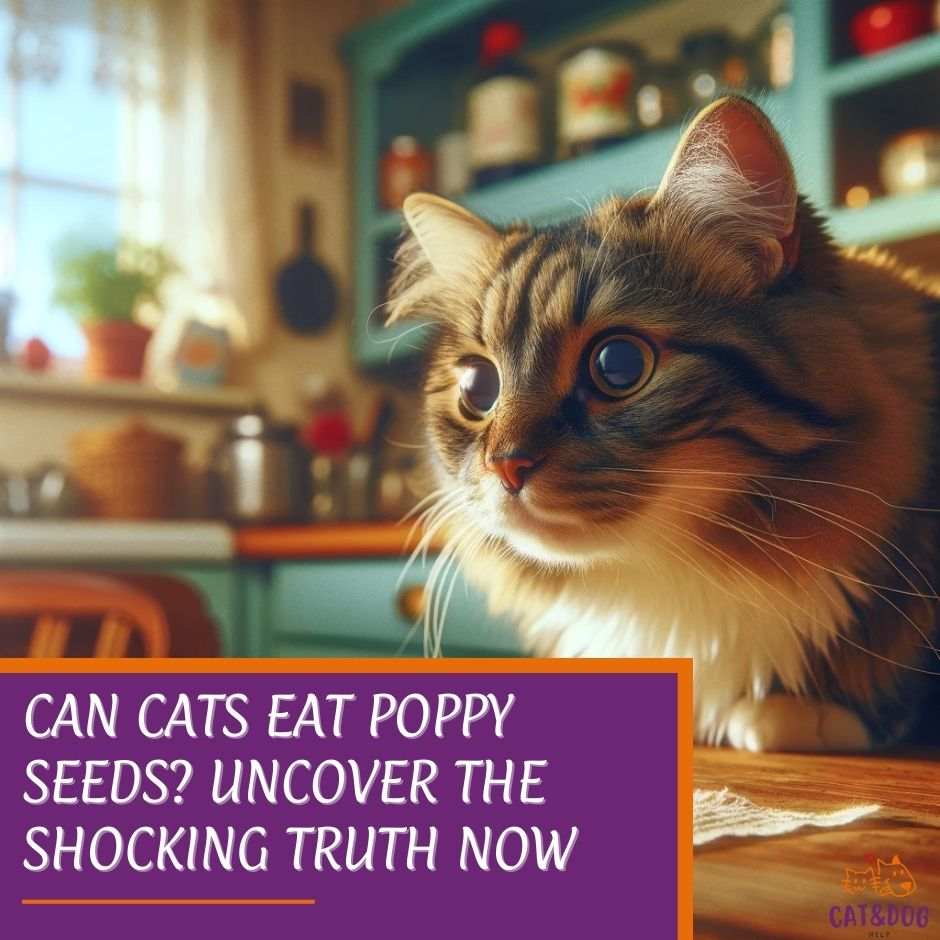Can cats eat poppy seeds? Curiosity about the safety of various foods for pets is common among cat owners, and one question that often pops up is whether cats can eat poppy seeds and other food items.
Understanding cat nutrition facts is vital for pet owners, especially when considering feeding cats items like poppy seeds, which may pose health risks despite their innocuous appearance to humans.
Poppy seeds are tiny seeds used in a variety of human dishes, from bread and muffins to salad dressings, imparting a nutty flavor and a bit of crunch.
But just because these seeds are a staple in our pantry, it doesn’t mean they are safe for our feline friends.
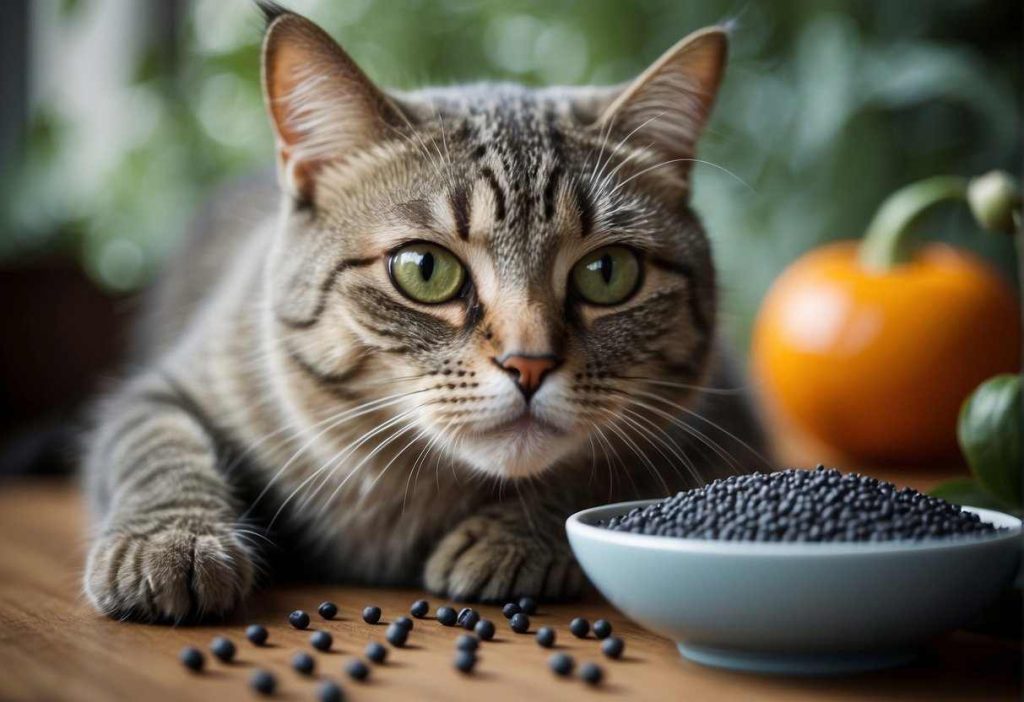
While nutrition is vital for cats, not all human foods are beneficial for them. In fact, some can be outright toxic. Understanding what cats can and cannot eat is essential for their health and well-being. (1)
In the long run, cats shouldn’t be eating seeds, anyway. Cats are classified as obligate carnivores, which means that most of a cat’s diet should contain meat.
In fact, at least 70% of your cat’s diet should consist of some kind of animal protein. Since cats are carnivores, they have a much harder time digesting and absorbing plant and vegetable matter.
Ever wondered why certain foods are a no-no for your kitty? Cats, unlike humans, process foods differently, and their bodies may react adversely to substances that are innocuous to us. (2)
The concept of toxic foods for cats includes a range of items that might surprise you, and poppy seeds are one of those.
While a sprinkle of poppy seeds on your bagel won’t harm you, the same can’t be said for your whiskered companion.
Key Takeaways
- Poppy seeds are used in human cuisine but are not safe for cats.
- Cats require a different diet than humans and can be sensitive to certain foods.
- Awareness of toxic foods is essential for cat health.
Can Cats Eat Poppy Seeds? Are Poppy Seeds Safe for Cats?
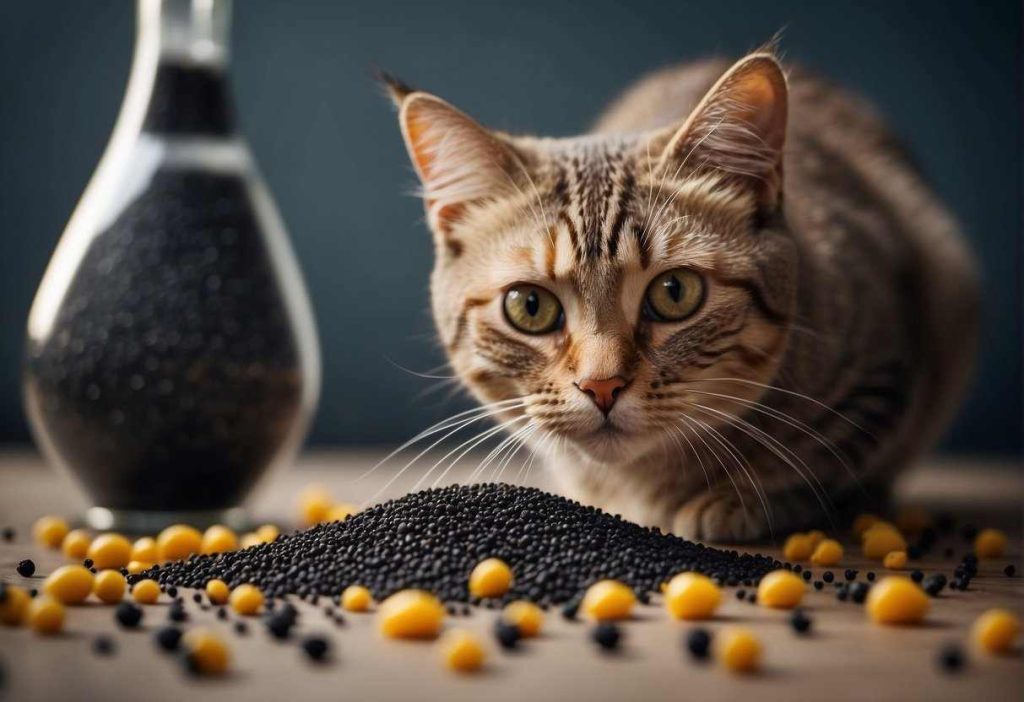
Have you ever wondered if those tiny poppy seeds that add a delightful crunch to your muffins are safe for your whiskered companion?
The answer is clear—it’s better to err on the side of caution. Poppy seeds are recognized as toxic to cats because they contain compounds that can be harmful.
However, your cat would need to ingest a fair amount of poppy seeds for them to be in danger.
Risks and Toxicity Poppy seeds are from the opium poppy plant, which harbors several alkaloids, including codeine and morphine. (3)
These substances, such as opium alkaloids, are typically associated with pain relief and sedation in humans but pose a significant risk to your furry friend. (4)
There’s no room for gambling with their health; even a small amount can lead to poisoning.
Symptoms of Adverse Reactions If your cat sneaks a taste of poppy seeds, watch for unsettling signs such as:
- Vomiting: An immediate reaction to expel the toxin.
- Diarrhea: Gastrointestinal distress is common.
- Lethargy: Look for unusual tiredness or lack of energy.
In the real world, a veterinarian shared a case where a curious cat ingested a poppy seed bagel and subsequently displayed disorientation and dilated pupils—a clear indication that something was amiss.
Remember, while you might enjoy a sprinkle of poppy seeds, it is important to prevent cats from accessing potentially harmful substances like poppy seeds.
Your cat’s health is not something to experiment with, so always keep poppy-seed-containing foods out of paw’s reach.
If you suspect your cat has ingested poppy seeds, contacting your vet immediately is crucial. Your furball relies on you to keep their nine lives safe and sound!
Veterinary Insights and Vet Recommendations
Ever wondered, “Can my furball enjoy the same poppy seed muffins I love?” The short answer from veterinarians is a resounding no.
Cats and poppy seeds don’t mix. Veterinary guidance advises against sharing your poppy seed-laden goodies with your kitty.
Dr. Harun, DVM, sternly warns, “Poppy seeds can be toxic to cats,” due to compounds that are safely metabolized by humans but not by our feline friends.
Adhering to guidelines on cat food poisoning prevention is crucial, especially when considering the potential risks associated with feeding your cat seemingly harmless items like poppy seeds.
Risks to Consider:
- Poppy seeds contain opiates that can lead to poisoning. Symptoms to watch for include lethargy, loss of coordination, and vomiting. (5)
- All parts of the poppy plant are toxic to cats, not just the seeds.
Kitchen Safety Tips:
- Store poppy seeds and poppy-containing foods securely.
- Ensure food scraps are disposed of safely or composted in a cat-proof system.
Avoiding Accidental Ingestion:
- Be vigilant during baking or cooking; curious cats may sneak a taste!
- If you suspect your cat has eaten poppy seeds, contact your vet immediately.
Switching gears, let’s talk about preventing a curious paw from causing trouble. A cat-proof container for poppy seeds?
Yes, please! And, here’s a pro tip: try using containers that are tricky for even the smartest feline to open.
Always keeping your baking ingredients out of paw’s reach could save you a trip to the vet. Remind yourself, “The treat I keep could be the peril they meet.”
Stay vigilant, keep a clean kitchen, and when in doubt, the safer the food, the better for your buddy’s mood.
Comprehensive Cat Nutrition
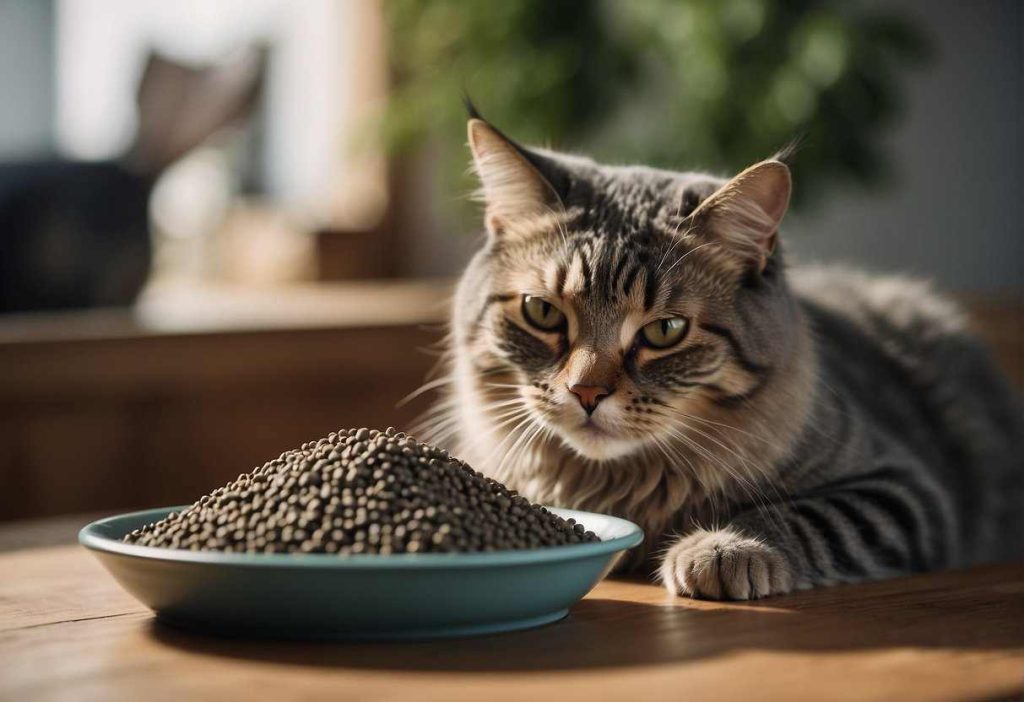
Ever wondered what goes into keeping your feline friend happy and healthy? Cats have specific dietary requirements.
Unlike us, cats obligate carnivores, which means they need a diet that’s high in protein from meat. Let’s chow down on the essentials of a purr-fect cat diet, shall we?
Protein: The star of the show! Your cat needs this for strong muscles. Poultry, beef, and fish are cat diet staples.
Fats: A dab of fats fuels the energy tank. Fats also carry essential fatty acids which are critical for a sleek coat.
Vitamins: Tiny but mighty! These are crucial for your cat’s overall well-being. Foods like liver can be a natural source. (6).
Minerals: Think of minerals as the unseen heroes. Calcium and phosphorus support strong bones and are often present in commercial cat foods.
Now, let’s compare your plate to your kitty’s. You might fancy a sprinkle of poppy seeds on your morning bagel, but these seeds are a big no-no for cats.
While poppy seeds might not necessarily intoxicate cats due to low alkaloid levels, they can still cause some unwanted effects like sedation.
Safe and Healthy Alternatives
Looking for treat ideas? Here are some cat-safe snacks that will make your furball purr with delight:
- Cooked Eggs: High in protein, and, let’s be honest, a bit of a Sunday brunch vibe for cats.
- Cantaloupe: Surprisingly, some cats adore the sweet taste, and it’s loaded with water and nutrients.
- Cooked Meat: Small pieces of chicken or turkey can be a tasty and protein-rich snack. (7)
Remember, moderation is key. Too much of a good thing can upset your cat’s diet. Just a nibble here and there for these treats, okay?
Besides these snack options, introducing non-toxic cat plants into your home can offer a safe and stimulating environment for your cat to explore.
In addition to choosing safe, everyday snacks for your furry friend, it’s equally important to focus on avoiding toxic cake ingredients when preparing homemade treats or celebrating special occasions to ensure all aspects of their diet remain safe and beneficial.
Keep your furry overlord healthy and happy with their regular balanced meals, and leave the poppy seeds to the humans.
Interactive Section: Facts and Myths about Poppy Toxicity

Ever heard that poppy seeds are a no-no for your fluffy friend? Let’s “paws” for a moment and sift through what’s true and what’s simply a tall tale. Ready to get the scoop on what’s okay for your kitty to nibble on?
Myth: Your cat can safely snack on poppy seeds.
Fact: Nope! Vets advise against it because poppy seeds can be toxic to cats.
Myth: A few poppy seeds won’t hurt your cat.
Fact: Truth be told, even small amounts can lead to health issues. Symptoms like vomiting and diarrhea are not on our fun list, are they?
Here’s a quick breakdown:
| Poppy Seed Fact | Is it Good for Cats? |
| They come from the opium poppy plant. | 😿 No |
| Aren’t known to cause intoxication in cats. | 😿 No |
| Can have mild sedative effects. | 😿 No |
| Some cats may show side effects, like vomiting. | 😿 Definitely No |
Let’s remember, that while we enjoy our poppy seed muffins, our feline friends should stick to their treats. And when in doubt, always ask your vet, because no one knows your cat like they do!
So, can cats eat poppy seeds? The answer is no! Keep these seeds out of paw’s reach, and instead, give your pal a catnip-filled toy.
Given poppy seeds’ potential to cause cat digestive upset, it’s essential to prioritize a diet that avoids such risks, ensuring your cat’s digestive system remains healthy and functional.
They’ll be purring for sure! Take these tidbits of info and you’ll be the ultimate cat myth buster.
Isn’t that right, whisker wizards? Keep your kitty safe and your trivia game strong. 🐾
Quick Recap
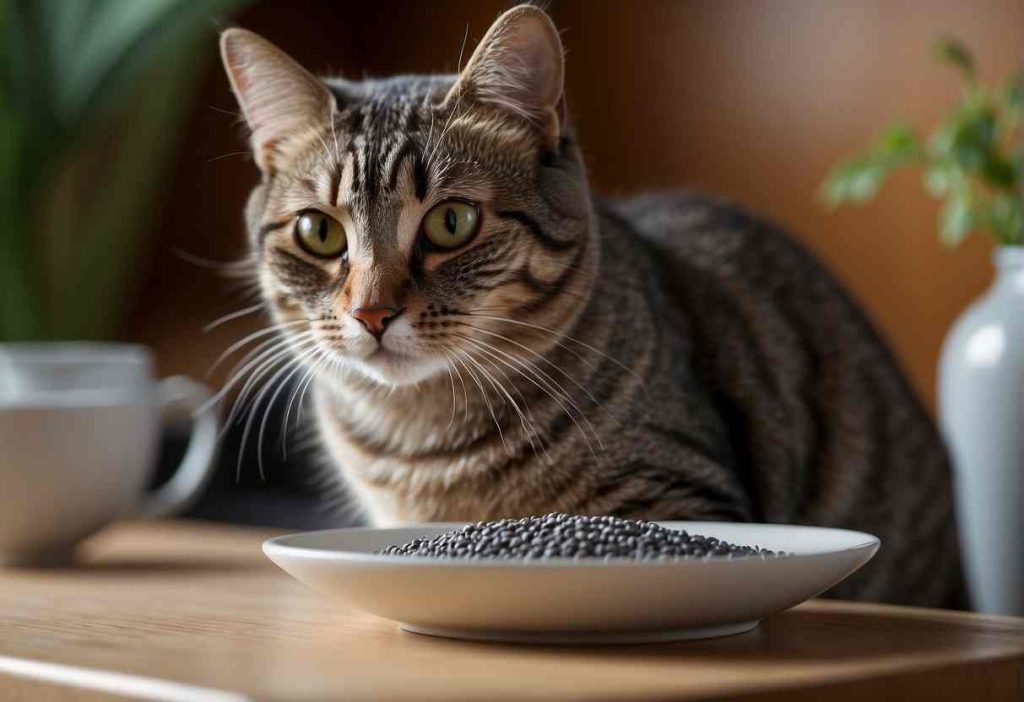
Did you know, poppy seeds can be a no-go for your fluffy friend? It turns out that while these tiny seeds aren’t famous for causing intoxication, they’re part of a plant that’s a big red flag for feline health.
Ingestion might lead to nausea, a bout of vomiting, or possibly more severe symptoms, such as reduced alertness or incoordination problems. So, saving that poppy seed muffin for yourself is the way to go.
Now, you might wonder, “But where can I learn more?” Check out these purr-fect resources for deeper insights:
- Veterinary insights on feline nutrition:
- ASPCA Poison Control Center for toxin-related queries.
- The Cornell Feline Health Center offers articles on cat care.
- Feline nutrition guides to balance your cat’s diet:
- International Cat Care for professional dietary advice.
- PetMD Cat Nutrition Center for all-round feline diet tips.
Remember, keep the poppy seeds to yourself, and always consult your vet if your kitty consumes something they shouldn’t have. After all, it’s better to be safe than to have a furry problem on your hands!
Frequently Asked Questions
If your whiskered companion has gotten into the spice rack, you might be wondering about the risks of poppy seeds. Let’s jump right into the pressing questions you might have.
What immediate steps should I take if my cat has eaten poppy seeds?
If you find that your cat has eaten poppy seeds, it’s time to act quickly. You should immediately contact your veterinarian or an emergency pet poison control center.
The quicker you get professional advice, the better it is for your furry friend.
Can poppy seeds affect a cat’s long-term health?
Yes, repeated exposure to poppy seeds can compromise your cat’s long-term health, potentially causing issues with the nervous system and digestive tract.
Always keep poppy seeds well out of paw’s reach.
Can poppy seeds affect different breeds of cats differently?
While there’s no evidence that different breeds react differently, sensitivity to poppy seeds can vary from cat to cat.
Regardless of breed, it’s wise to avoid giving your cat poppy seeds altogether.
Is there a safe quantity of poppy seeds for cats?
No safe quantity of poppy seeds for cats has been established. Since they can be toxic, it’s best to steer clear of giving any amount to your cat.
How quickly do symptoms appear after a cat eats poppy seeds?
Symptoms of poppy seed toxicity in cats can appear within a few hours.
Keep a sharp eye out for signs like sedation, loss of appetite, or difficulty walking and get Veterinary help if you’re concerned.
What are some cat-friendly alternatives to poppy seeds for a curious feline?
Curious kitties might enjoy a bit of catnip or specially formulated cat treats instead of human food that can be harmful.
Keeping these safer alternatives on hand can satisfy their curiosity without the risk.
What are some common foods that contain poppy seeds?
Poppy seeds are often found in baked goods like muffins, bagels, and pastries.
Always check the ingredient list of anything you might be tempted to share with your cat, and remember, when in doubt, keep it out!

